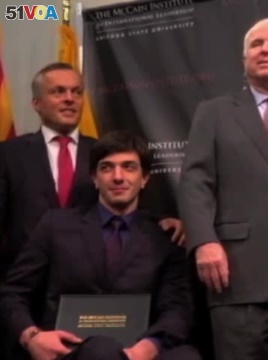August 26,2014
WASHINGTON— Nine young people from around the world have been spending the past year in the United States - learning the ins and outs of local government. They’re the first participants in a “Next Generation Leaders” program, run by a Washington-based policy institute.

The members of the group have spent their time in U.S. working with nongovernmental organizations, local governments and major businesses- learning about the best practices in their respective fields.
The program is aimed at fostering “character-driven leadership,” and is run by the McCain Institute for International Leadership - named after U.S. Senator John McCain.
Senator McCain himself spoke at the ceremony. “We need to do everything we can to have the next generation of leaders best prepared in the turmoil that will be with us for some time,” he said.
Though it’s based in Washington, the McCain Institute is part of Arizona State University, in the senator’s home state.
Senior advisor Ben Freakley said the Institute will continue to support the graduates in their home countries.
“It’s the McCain Institute’s job to draw attention to the work they are doing in their home countries. If they need resources or subject matter expertise or research by reaching back on Arizona State University - it’s our job to support them to be successful,” he said.
The graduates have various goals in mind as they return home.
Soraya Aziz Souleymane, who works for a mining company in the Democratic Republic of the Congo, would like to decrease the mining industry’s negative impact on local communities.
“So, as I go back, I’m trying to implement that as I work with the North American mining companies. The program gave me exposure, and it also gave me a huge network of people working at various institutions that can make a very positive impact in my country,” said Souleymane.
Zaheer Abbas is a civil society activist from Pakistan’s conflict-torn tribal areas. He wants to reduce violence in the region by offering programs to Pakistani men and boys to encourage changes in their perceptions of masculine behavior.
“I’m trying to make men to be peacemakers, targeting their masculine perceptions and also trying to make them better human beings to be helpful and supportive of women’s empowerment efforts at the [same] time,” said Abbas.
Executive Director Kurt Volker said the eventual goal is to create a global network of people committed to democratic values and leadership.
“We are looking for people who are going to, in their own societies, advance those kinds of values to bring about better lives for the people in those countries and a better world environment for all of us to live in," said Volker.
This year’s graduates now have returned to their home countries. The McCain institute hopes to double the number of program participants next year.